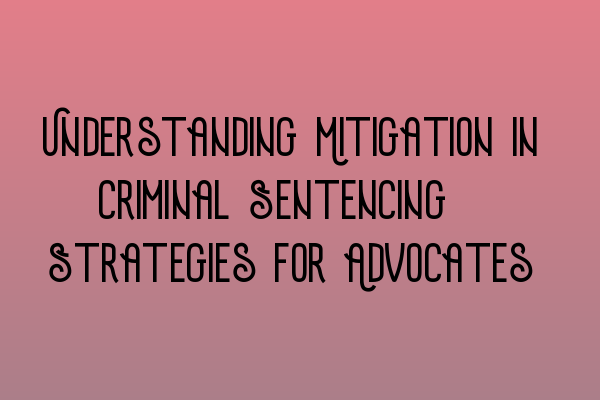Understanding Mitigation in Criminal Sentencing: Strategies for Advocates
When it comes to criminal sentencing, mitigation plays a crucial role in determining the outcome of a case. Mitigation refers to the process of presenting factors that may lessen the gravity of an offense and thereby reduce the severity of the sentence imposed. As criminal lawyers, it is essential to have a thorough understanding of mitigation strategies in order to effectively advocate for our clients.
The Importance of Mitigation
Mitigation is a key element of a successful defense strategy. It allows us to humanize our clients, present their personal circumstances, and highlight any relevant factors that may have influenced their actions. By highlighting mitigating factors, we can demonstrate to the court that our clients are deserving of a more lenient sentence.
There are various types of mitigating factors that may be relevant in a criminal case. These include:
- Personal Circumstances: Advocates should explore the defendant’s background, family situation, education, employment, and any other relevant factors that may have contributed to their actions.
- Remorse: Expressing genuine remorse and taking responsibility for the offense can significantly impact the sentencing decision.
- Cooperation: If the defendant has cooperated with the police or shown willingness to assist in the investigation, it can be used as a mitigating factor.
- Mental Health: Mental health issues can contribute to criminal behavior and may be considered as a mitigating factor.
- Substance Abuse: If substance abuse played a role in the offense, seeking treatment and demonstrating commitment to recovery can be a compelling mitigating factor.
Effective Mitigation Strategies
When presenting mitigation, it is crucial to tailor the strategy to the specific circumstances of each case. Some effective strategies include:
- Providing supporting evidence such as character references, medical records, or expert testimony to corroborate the mitigating factors being presented.
- Framing the mitigation in a narrative that resonates with the court, emphasizing the defendant’s journey of growth, rehabilitation, and commitment to positive change.
- Clearly articulating the impact of a more lenient sentence on the defendant’s future prospects, including their ability to reintegrate into society, maintain employment, or pursue rehabilitation.
By employing these strategies, advocates can significantly impact the outcome of a sentencing hearing and secure a more favorable result for their clients.
Conclusion
Understanding mitigation in criminal sentencing and implementing effective strategies is crucial for advocates. By presenting compelling mitigating factors, we can humanize our clients, demonstrate their potential for rehabilitation, and ultimately secure a more favorable outcome. Mitigation is a complex and nuanced area of law, but with the right approach, we can navigate it successfully in defense of our clients.
